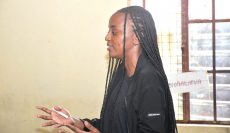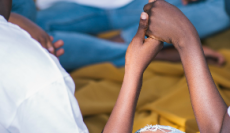|By Juliet Hinga|
Learning goes beyond the acquisition of facts and knowledge, students must know how to apply this knowledge outside the classroom; in the real world. It is crucial for learning institutions to produce active, socially aware, and engaged learners. At Strathmore University Business School we endeavor to create well-rounded graduates, by instilling skills that go beyond academic skills and the classroom setting. One of the requirements of our courses is 225 hours of community service through the Service-Based Learning (SBL) Program.
The SBL program is important because it connects the students’ learning experiences in class with real-world experiences in the community. At the society level, it is critical for individuals to be involved and in touch with the needs of their communities so they can assist each other and be more conscientious individuals. By working with community members, students can enhance their group, organizational and interpersonal skills. They also can gain important experience working with diverse members of their communities.
Serviced Based Learning is a form of experiential education that combines learning objectives and community service to society in ways that promote the development of the students and the common good of the society. It can also be defined as a teaching and learning strategy that integrates meaningful community service with instruction and reflection to enrich the learning experience, teach civic responsibility and strengthen communities (Barreneche, 2011).
Our SBL Program has three key objectives: to achieve learning objectives, to achieve a service objective that benefits the society, and also to serve as an assessment of the student learning achievements. Four Bachelor of Commerce students; Dhavan Satin Shah, Sagar Bharat Patel, Joy Waweru and Divyen Manish Bid undertook their Service-Based Learning Project at Hospital Hill Primary School, Parklands earlier this year and did very well in their assessment.
Speaking about her SBL experience, Joy said, “my experience at Hospital Hill Primary School was fun, interactive, and eye-opening. I got to interact with the pupils at a more personal level through conversation, grading their assignments, and providing feedback. It was great to hear about their experiences, views about life, and ambitions for the future at a young age. The diversity of background and ideas at the school was interesting to learn about and made me appreciate how different and unique every single person can be.” On her key takeaways, she noted the importance of teamwork. “Teamwork makes the dream work. Together with the staff, we were able to create a better learning environment for the pupils and this was reflected in their end-of-term examination, ” she said.
Dhavan described his experience as insightful, “it was truly one of the best learning experiences I have had. A lot of what I learned went beyond the classroom and academics. Most importantly, I learned the importance of giving back to society which I believe is a lifelong lesson. I learned various skills such as effective communication, teaching, interactive skills, and patience when dealing with students, which will not only benefit my career, but also life in general,” he said.
Sagar highlighted the importance of environmental conservation as one of his key takeaways from the SBL, “the students at Hospital Hill changed my view towards climate change. They made me realize that we are the problem when it comes to global warming and we need to change that by conserving our environment. This pushed us to come up with the Go Green Initiative whereby my colleagues and I planted various fruit trees around the school,” Sagar Patel noted.
Divyen Manish Bid summarised his five key takeaways as follows:
- Appreciate the little things in life.
- Give back to society anytime you can.
- Be patient and friendly.
- Learn to adjust in different environments
- Environmental conservation is very important
Our Bachelor of Commerce Degree Programme is structured to reflect the changing world of commerce and to equip its learners with the necessary skills, ethical principles, and general knowledge needed for decision-making in a contemporary business environment.
May Intake for the Bachelor of Commerce Programme is ongoing
References
- Barreneche, G. (2011). Language Learners as Teachers: Integrating Service-learning and the Advanced Language Course. Hispania, 94(1), 103-120. Retrieved May 7, 2021, from http://www.jstor.org/stable/23032088






